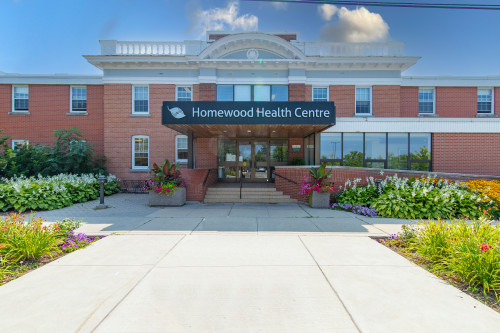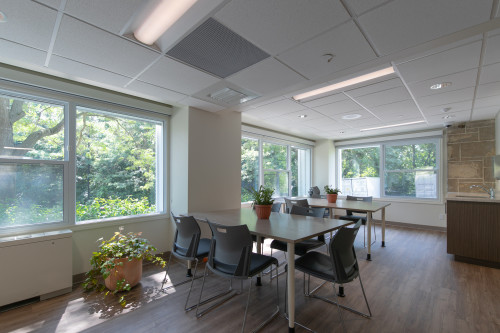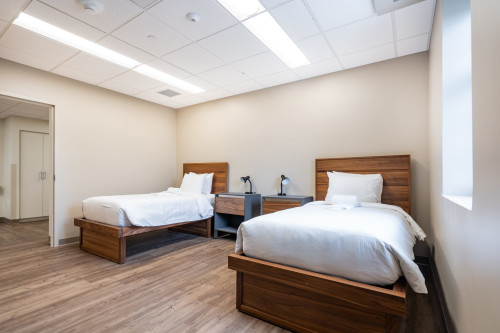








Homewood Health Centre
Verified Center
This provider's information has been quality-checked by Recovery.com's Research Team for accuracy and completeness, including center verification through appropriate third-party organizations.
Treatment Focus
This center treats mental health conditions and co-occurring substance use. You receive collaborative, individualized treatment that addresses both issues for whole-person healing.
Primary Level of Care
Offering intensive care with 24/7 monitoring, residential treatment is typically 30 days and can cover multiple levels of care. Length can range from 14 to 90 days typically.
Treatment Focus
This center treats mental health conditions and co-occurring substance use. You receive collaborative, individualized treatment that addresses both issues for whole-person healing.
Primary Level of Care
Offering intensive care with 24/7 monitoring, residential treatment is typically 30 days and can cover multiple levels of care. Length can range from 14 to 90 days typically.
Provider's Policy
As a part of the intake process, Homewood Health Centre intake will collect benefits/insurance information from our patients. Our Intake team will connect with the benefits/insurance provider and confirm coverages that are available. In many cases employer benefits/third party insurance for Ontario residents cover the costs of accommodation rates at the Homewood Health Centre.
Homewood Health Centre
Homewood Health Centre
About Homewood Health Centre
Located in a relaxing 50 acre setting in Guelph, Ontario, Homewood Health Centre is a fully accredited, physician-led, medically based inpatient treatment facility treating a wide range of primary mental health concerns, as well as co-occurring mental health and addiction issues. They offer specialized programs for first responders, military personnel and veterans, health care providers, eating disorders, and women with complex trauma.
Programs for Mental Health, Addiction & Eating Disorders
Homewood Health Centre’s clients are met with a compassionate, comprehensive approach to ensure their distinct challenges are addressed effectively and in the personalized way they deserve. All programs are based on a bio-psycho-social-spiritual approach to recovery. Clients receive regular 1:1 sessions throughout treatment, tailored to their unique needs. Programming is primarily group based, so the bulk of a client's time will be in group sessions. Programs include group dialectical behavioral therapy (DBT), individual cognitive behavioral therapy (CBT), motivational interviewing, behavioral activation, interpersonal therapy, art, music horticulture, and recreation therapies. For addictions, their program covers stabilization followed by long-term recovery. Homewood Health Centre also offers Canada’s largest inpatient eating disorder program to those 16 or older; it focuses on normalizing eating and activity and interrupting eating disorder symptoms.
Recovery Management
Homewood offers different recovery management and outpatient programs that provide professional support and guidance to help individuals sustain their recovery. Homewood’s recovery management initiatives focus on skill consolidation, relapse prevention, overall wellness, and the involvement of one’s family and support system. These offerings can be tailored to meet the needs of each client.
A Comfortable and Safe Place for Quality Care
Homewood Health Centre is located on over 50 acres of green space on the banks of the Speed River in Guelph, Ontario. Their grounds house several amenities, including forested walking trails, a baseball diamond, tennis and basketball courts, a meditation garden, horseshoe pits, a gazebo, reading nooks and gardens. Clients enjoy their well-appointed gym, recreation centre, greenhouse for horticultural therapy, music therapy room, arts and crafts, laundry facilities, library, dining room, café and gift shop. They also have on-site massage and osteopathy therapies on a fee-for-service basis. Clients can stay in private or shared rooms.

Highlights from the Center
Highlights
These highlights are provided by and paid for by the center.
Customized Treatment Plans
40+ Acre Campus
Addiction Recovery
Trauma Treatment
Center Overview
Treatment Focus
This center treats mental health conditions and co-occurring substance use. You receive collaborative, individualized treatment that addresses both issues for whole-person healing.
Joint Commission Accredited
The Joint Commission accreditation is a voluntary, objective process that evaluates and accredits healthcare organizations (like treatment centers) based on performance standards designed to improve quality and safety for patients. To be accredited means the treatment center has been found to meet the Commission's standards for quality and safety in patient care.

Homewood Health Centre
Insurance Accepted
Cash Pay Rates
Estimated Cash Pay Rate
Center pricing can vary based on program and length of stay. Contact the center for more information. Recovery.com strives for price transparency so you can make an informed decision.




Other Homewood Health Locations
Recovery.com Verified Listing
Recovery.com verified that the name, location, contact information and license to operate for this treatment provider are valid and up-to-date.

Accreditation Canada Accredited with Exemplary Standing

Licensed
Recovery.com is an independent, third-party mental health resource. Verification does not imply endorsement and does not guarantee the quality of treatment services.
Your Care Options
Specializations
Anxiety
Anxiety is a common mental health condition that can include excessive worry, panic attacks, physical tension, and increased blood pressure.
Depression
Symptoms of depression may include fatigue, a sense of numbness, and loss of interest in activities. This condition can range from mild to severe.
Eating Disorders
An eating disorder is a long-term pattern of unhealthy behavior relating to food. Most people with eating disorders have a distorted self-image.
Post Traumatic Stress Disorder
PTSD is a long-term mental health issue caused by a disturbing event or events. Symptoms include anxiety, dissociation, flashbacks, and intrusive thoughts.
Suicidality
With suicidality, a person fantasizes about suicide, or makes a plan to carry it out. This is a serious mental health symptom.
Trauma
Some traumatic events are so disturbing that they cause long-term mental health problems. Those ongoing issues can also be referred to as "trauma."
First Responders Program
Paramedics, police officers, firefighters, and others join in a specific First Responders program, usually focused on trauma, grief, and work-life balance.
Who We Treat
Older Adults
Addiction and mental health treatment caters to adults 55+ and the age-specific challenges that can come with recovery, wellness, and overall happiness.
Young Adults
Emerging adults ages 18-25 receive treatment catered to the unique challenges of early adulthood, like college, risky behaviors, and vocational struggles.
LGBTQ+
Addiction and mental illnesses in the LGBTQ+ community must be treated with an affirming, safe, and relevant approach, which many centers provide.
Men and Women
Men and women attend treatment for addiction in a co-ed setting, going to therapy groups together to share experiences, struggles, and successes.
Midlife Adults
For adults ages 40+, treatment shifts to focus on the unique challenges, blocks, and risk factors of their age group, and unites peers in a similar community.
Veterans
Patients who completed active military duty receive specialized treatment focused on trauma, grief, loss, and finding a new work-life balance.
Treatment Services
Day Treatment
In a PHP, patients live at home but follow an intensive schedule of treatment. Most programs require you to be on-site for about 40 hours per week.
Intensive Inpatient
The highest level of care, medically managed intensive inpatient services provides 24-hour nursing and physician care.
Detox
Detox fully and safely removes toxic substances from the body, allowing the next steps in treatment to begin with a clean slate.
Intensive Outpatient Program
In an IOP, patients live at home or a sober living, but attend treatment typically 9-15 hours a week. Most programs include talk therapy, support groups, and other methods.
Licensed Primary Mental Health
Some primary care providers offer mental health diagnosis and treatment. This can prevent patients from developing more serious conditions.
Outpatient
During outpatient rehab, patients attend a structured treatment program while continuing to live at home.
Residential
In a residential rehab program, patients live onsite, with access to daily treatment and 24-hour care. An average stay is 30-90 days.
Approaches
Evidence-Based
A combination of scientifically rooted therapies and treatments make up evidence-based care, defined by their measured and proven results.
Holistic
A non-medicinal, wellness-focused approach that aims to align the mind, body, and spirit for deep and lasting healing.
Medical
Medical addiction treatment uses approved medications to manage withdrawals and cravings, and to treat contributing mental health conditions.
Therapies
1-on-1 Counseling
Patient and therapist meet 1-on-1 to work through difficult emotions and behavioral challenges in a personal, private setting.
Meditation & Mindfulness
A practiced state of mind that brings patients to the present. It allows them to become fully aware of themselves, their feelings, and the present moment.
Trauma-Specific Therapy
This form of talk therapy addresses any childhood trauma at the root of a patient's current diagnosis.
Mindfulness Therapy
This ancient practice can be mental, emotional, and even spiritual. In meditation, you focus your attention on the present moment without judgement.
Art Therapy
Visual art invites patients to examine the emotions within their work, focusing on the process of creativity and its gentle therapeutic power.
Body Image Therapy
Therapists use cognitive behavior techniques to challenge how patients perceive their body and their worth, rewriting negative thoughts and attitudes.
Expressive Arts
Creative processes like art, writing, or dance use inner creative desires to help boost confidence, emotional growth, and initiate change.
Conditions We Treat
Grief and Loss
Grief is a natural reaction to loss, but severe grief can interfere with your ability to function. You can get treatment for this condition.
Anger
Although anger itself isn't a disorder, it can get out of hand. If this feeling interferes with your relationships and daily functioning, treatment can help.
Anxiety
Anxiety is a common mental health condition that can include excessive worry, panic attacks, physical tension, and increased blood pressure.
Burnout
Burnout entails mental and physical exhaustion, and leads to a severe lack of fulfillment. This condition is often caused by overwork.
Chronic Pain Management
Long-term physical pain can have an affect on mental health. Without support, it can also impact your daily life and even lead to addiction.
Depression
Symptoms of depression may include fatigue, a sense of numbness, and loss of interest in activities. This condition can range from mild to severe.
Eating Disorders
An eating disorder is a long-term pattern of unhealthy behavior relating to food. Most people with eating disorders have a distorted self-image.
Post Traumatic Stress Disorder
PTSD is a long-term mental health issue caused by a disturbing event or events. Symptoms include anxiety, dissociation, flashbacks, and intrusive thoughts.
Self-Harm
The act of intentionally harming oneself, also called self-injury, is associated with mental health issues like depression.
Substances We Treat
Alcohol
Using alcohol as a coping mechanism, or drinking excessively throughout the week, signals an alcohol use disorder.
Benzodiazepines
Benzodiazepines are prescribed to treat anxiety and sleep issues. They are highly habit forming, and their abuse can cause mood changes and poor judgement.
Co-Occurring Disorders
A person with multiple mental health diagnoses, such as addiction and depression, has co-occurring disorders also called dual diagnosis.
Drug Addiction
Drug addiction is the excessive and repetitive use of substances, despite harmful consequences to a person's life, health, and relationships.
Ecstasy
Ecstasy is a stimulant that causes intense euphoria and heightened awareness. Abuse of this drug can trigger depression, insomnia, and memory problems.
Heroin
Heroin is a highly addictive and illegal opioid. It can cause insomnia, collapsed veins, heart issues, and additional mental health issues.
Methamphetamine
Methamphetamine, or meth, increases energy, agitation, and paranoia. Long-term use can result in severe physical and mental health issues.
Opioids
Opioids produce pain-relief and euphoria, which can lead to addiction. This class of drugs includes prescribed medication and the illegal drug heroin.
Languages
Aftercare
Care Designed for Your Needs
Personal Amenities
Amenities
Activities
Yoga
Yoga is both a physical and spiritual practice. It includes a flow of movement, breathing techniques, and meditation.
Off-Site Activities
Off-Site Amenities

Learn More About the Center
Mental Health Moment – Body Positivity and Self-Acceptance
Listen to a 4-minute audio meditation that shifts focus to things to like about our bodies and ourselves.
PTSD in the Workplace
Learn about solutions and support for everyday coworkers experiencing PTSD.
Addressing Women’s Trauma Care
Find out about the new light being shed on the unique challenges faced by women in trauma and addiction recovery.
Understanding Eating Disorders and How to Get Help
Explore the types of eating disorders, their signs, potential causes, and how Homewood’s approach can foster lasting recovery.
What people are saying
Treatment
4.8
Accommodations
3.8
Food & Nutrition
4.3
Value
4.5
Pros
- Excellent & Effective Treatment Programming (2)
- Friendly & Competent Staff (2)
- Beautiful Location (2)
- Access to Nature (2)
Cons
- Shallow Post-Treatment Planning (2)
- Uncomfortable Accommodations (2)
- Not Enough Time With Therapist (2)
BH
Treatment in 2021 • (60 days) • Reviewed 03/19/25
Former Client
•Law Enforcement
•Vancouver, BC
Brady H
Treatment in 2021 • (63 days) • Reviewed 10/17/24
Former Client
•Staff Sergeant
•Surrey, BC





